Reflective Essay: Engineering Innovation and Ethics
VerifiedAdded on 2023/03/17
|7
|1671
|26
AI Summary
This reflective essay demonstrates the capability to reflect on being an effective engineer while negotiating agreements amid mining and oil gas companies and traditional owners for the success of engineering projects. The essay focuses on investigating the history of the treatment of Aboriginal Australians and how it may impact the ethical practice of engineering. The author uses the DIEP framework (Describe, Interpret, Evaluate, and Plan) to reflect on their insights and learning from the research. The essay also discusses the importance of cross-cultural communication and engagement with Indigenous Australians in engineering projects.
Contribute Materials
Your contribution can guide someone’s learning journey. Share your
documents today.
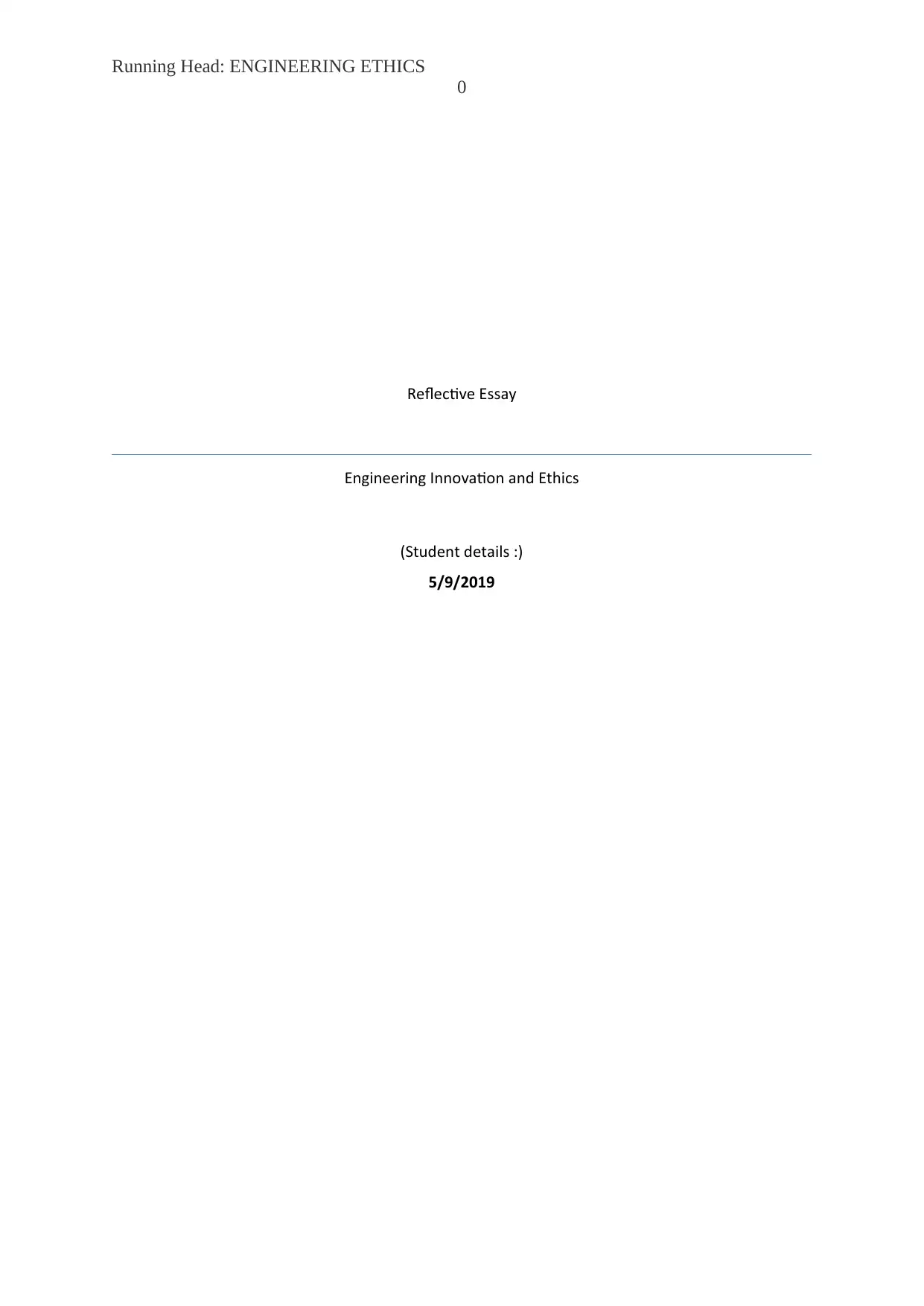
Running Head: ENGINEERING ETHICS
0
Reflective Essay
Engineering Innovation and Ethics
(Student details :)
5/9/2019
0
Reflective Essay
Engineering Innovation and Ethics
(Student details :)
5/9/2019
Secure Best Marks with AI Grader
Need help grading? Try our AI Grader for instant feedback on your assignments.
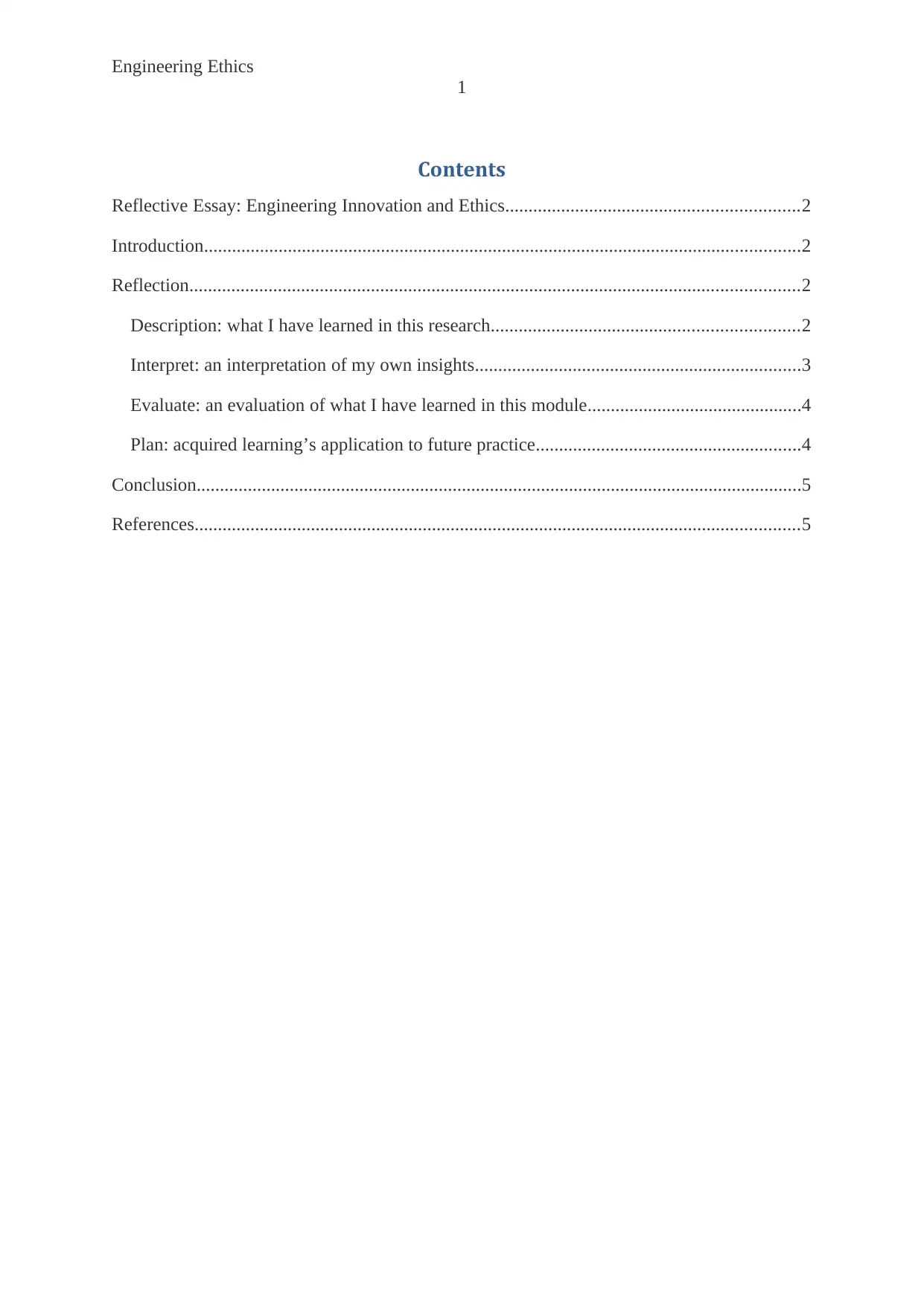
Engineering Ethics
1
Contents
Reflective Essay: Engineering Innovation and Ethics...............................................................2
Introduction................................................................................................................................2
Reflection...................................................................................................................................2
Description: what I have learned in this research..................................................................2
Interpret: an interpretation of my own insights......................................................................3
Evaluate: an evaluation of what I have learned in this module..............................................4
Plan: acquired learning’s application to future practice.........................................................4
Conclusion..................................................................................................................................5
References..................................................................................................................................5
1
Contents
Reflective Essay: Engineering Innovation and Ethics...............................................................2
Introduction................................................................................................................................2
Reflection...................................................................................................................................2
Description: what I have learned in this research..................................................................2
Interpret: an interpretation of my own insights......................................................................3
Evaluate: an evaluation of what I have learned in this module..............................................4
Plan: acquired learning’s application to future practice.........................................................4
Conclusion..................................................................................................................................5
References..................................................................................................................................5
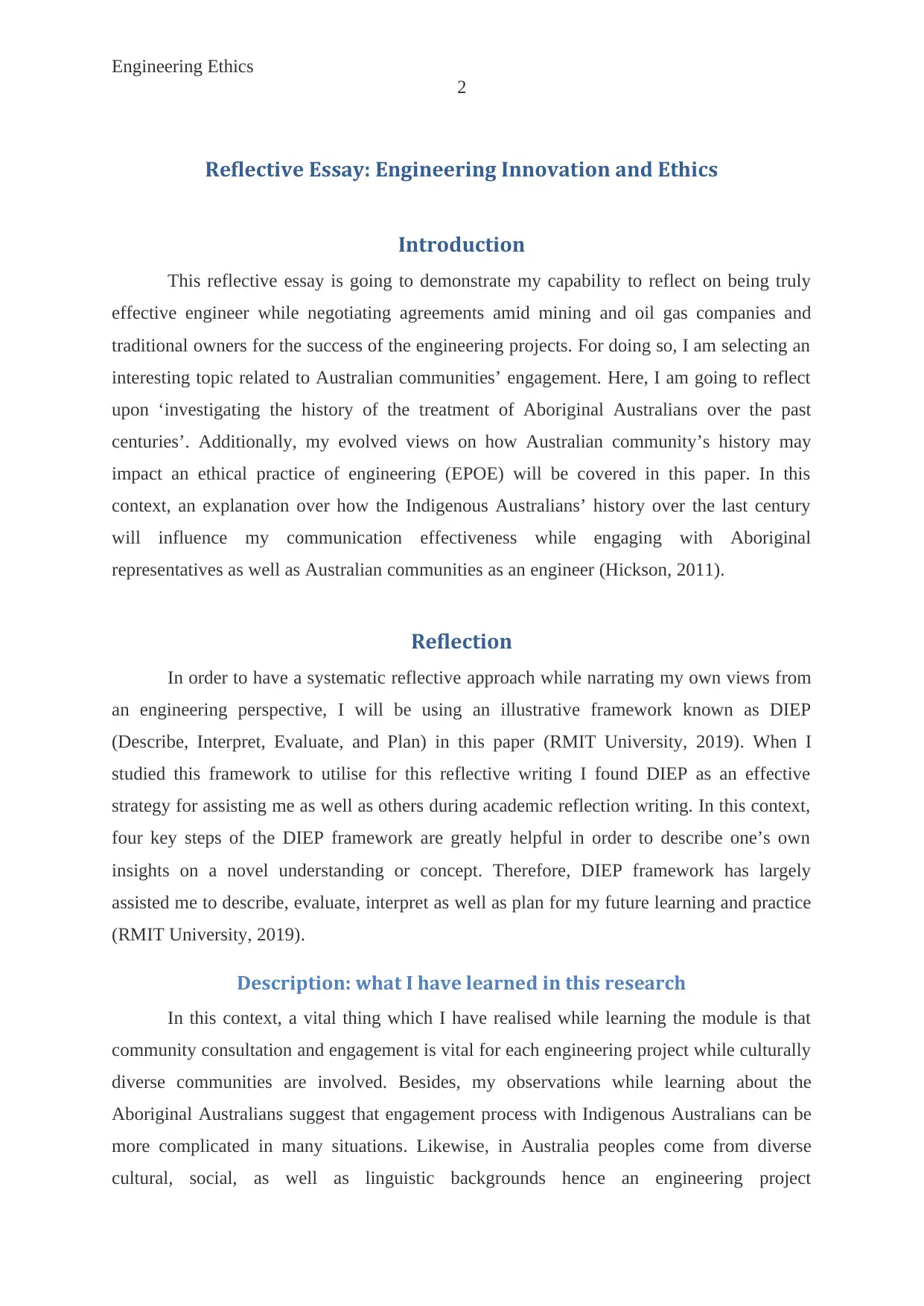
Engineering Ethics
2
Reflective Essay: Engineering Innovation and Ethics
Introduction
This reflective essay is going to demonstrate my capability to reflect on being truly
effective engineer while negotiating agreements amid mining and oil gas companies and
traditional owners for the success of the engineering projects. For doing so, I am selecting an
interesting topic related to Australian communities’ engagement. Here, I am going to reflect
upon ‘investigating the history of the treatment of Aboriginal Australians over the past
centuries’. Additionally, my evolved views on how Australian community’s history may
impact an ethical practice of engineering (EPOE) will be covered in this paper. In this
context, an explanation over how the Indigenous Australians’ history over the last century
will influence my communication effectiveness while engaging with Aboriginal
representatives as well as Australian communities as an engineer (Hickson, 2011).
Reflection
In order to have a systematic reflective approach while narrating my own views from
an engineering perspective, I will be using an illustrative framework known as DIEP
(Describe, Interpret, Evaluate, and Plan) in this paper (RMIT University, 2019). When I
studied this framework to utilise for this reflective writing I found DIEP as an effective
strategy for assisting me as well as others during academic reflection writing. In this context,
four key steps of the DIEP framework are greatly helpful in order to describe one’s own
insights on a novel understanding or concept. Therefore, DIEP framework has largely
assisted me to describe, evaluate, interpret as well as plan for my future learning and practice
(RMIT University, 2019).
Description: what I have learned in this research
In this context, a vital thing which I have realised while learning the module is that
community consultation and engagement is vital for each engineering project while culturally
diverse communities are involved. Besides, my observations while learning about the
Aboriginal Australians suggest that engagement process with Indigenous Australians can be
more complicated in many situations. Likewise, in Australia peoples come from diverse
cultural, social, as well as linguistic backgrounds hence an engineering project
2
Reflective Essay: Engineering Innovation and Ethics
Introduction
This reflective essay is going to demonstrate my capability to reflect on being truly
effective engineer while negotiating agreements amid mining and oil gas companies and
traditional owners for the success of the engineering projects. For doing so, I am selecting an
interesting topic related to Australian communities’ engagement. Here, I am going to reflect
upon ‘investigating the history of the treatment of Aboriginal Australians over the past
centuries’. Additionally, my evolved views on how Australian community’s history may
impact an ethical practice of engineering (EPOE) will be covered in this paper. In this
context, an explanation over how the Indigenous Australians’ history over the last century
will influence my communication effectiveness while engaging with Aboriginal
representatives as well as Australian communities as an engineer (Hickson, 2011).
Reflection
In order to have a systematic reflective approach while narrating my own views from
an engineering perspective, I will be using an illustrative framework known as DIEP
(Describe, Interpret, Evaluate, and Plan) in this paper (RMIT University, 2019). When I
studied this framework to utilise for this reflective writing I found DIEP as an effective
strategy for assisting me as well as others during academic reflection writing. In this context,
four key steps of the DIEP framework are greatly helpful in order to describe one’s own
insights on a novel understanding or concept. Therefore, DIEP framework has largely
assisted me to describe, evaluate, interpret as well as plan for my future learning and practice
(RMIT University, 2019).
Description: what I have learned in this research
In this context, a vital thing which I have realised while learning the module is that
community consultation and engagement is vital for each engineering project while culturally
diverse communities are involved. Besides, my observations while learning about the
Aboriginal Australians suggest that engagement process with Indigenous Australians can be
more complicated in many situations. Likewise, in Australia peoples come from diverse
cultural, social, as well as linguistic backgrounds hence an engineering project
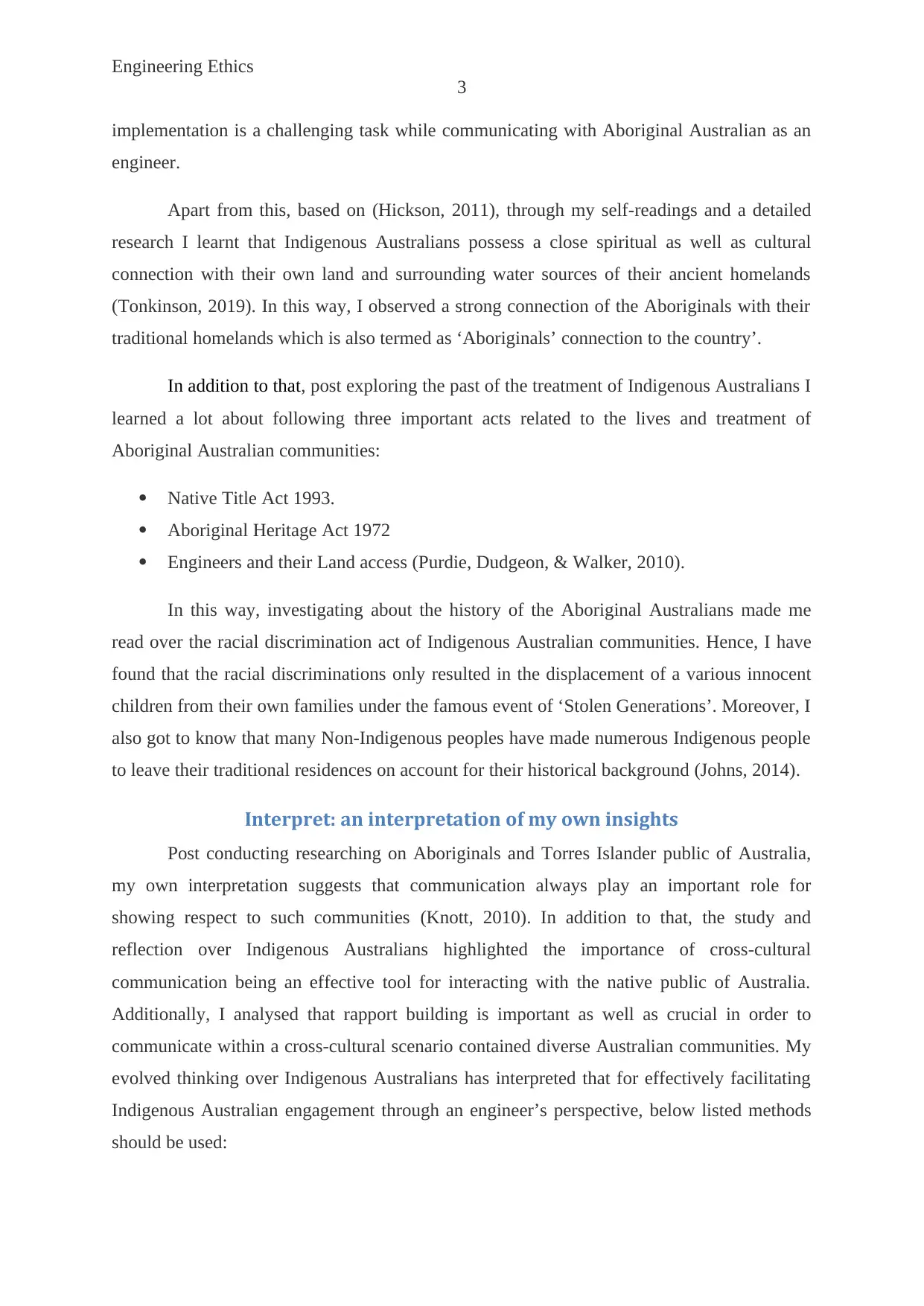
Engineering Ethics
3
implementation is a challenging task while communicating with Aboriginal Australian as an
engineer.
Apart from this, based on (Hickson, 2011), through my self-readings and a detailed
research I learnt that Indigenous Australians possess a close spiritual as well as cultural
connection with their own land and surrounding water sources of their ancient homelands
(Tonkinson, 2019). In this way, I observed a strong connection of the Aboriginals with their
traditional homelands which is also termed as ‘Aboriginals’ connection to the country’.
In addition to that, post exploring the past of the treatment of Indigenous Australians I
learned a lot about following three important acts related to the lives and treatment of
Aboriginal Australian communities:
Native Title Act 1993.
Aboriginal Heritage Act 1972
Engineers and their Land access (Purdie, Dudgeon, & Walker, 2010).
In this way, investigating about the history of the Aboriginal Australians made me
read over the racial discrimination act of Indigenous Australian communities. Hence, I have
found that the racial discriminations only resulted in the displacement of a various innocent
children from their own families under the famous event of ‘Stolen Generations’. Moreover, I
also got to know that many Non-Indigenous peoples have made numerous Indigenous people
to leave their traditional residences on account for their historical background (Johns, 2014).
Interpret: an interpretation of my own insights
Post conducting researching on Aboriginals and Torres Islander public of Australia,
my own interpretation suggests that communication always play an important role for
showing respect to such communities (Knott, 2010). In addition to that, the study and
reflection over Indigenous Australians highlighted the importance of cross-cultural
communication being an effective tool for interacting with the native public of Australia.
Additionally, I analysed that rapport building is important as well as crucial in order to
communicate within a cross-cultural scenario contained diverse Australian communities. My
evolved thinking over Indigenous Australians has interpreted that for effectively facilitating
Indigenous Australian engagement through an engineer’s perspective, below listed methods
should be used:
3
implementation is a challenging task while communicating with Aboriginal Australian as an
engineer.
Apart from this, based on (Hickson, 2011), through my self-readings and a detailed
research I learnt that Indigenous Australians possess a close spiritual as well as cultural
connection with their own land and surrounding water sources of their ancient homelands
(Tonkinson, 2019). In this way, I observed a strong connection of the Aboriginals with their
traditional homelands which is also termed as ‘Aboriginals’ connection to the country’.
In addition to that, post exploring the past of the treatment of Indigenous Australians I
learned a lot about following three important acts related to the lives and treatment of
Aboriginal Australian communities:
Native Title Act 1993.
Aboriginal Heritage Act 1972
Engineers and their Land access (Purdie, Dudgeon, & Walker, 2010).
In this way, investigating about the history of the Aboriginal Australians made me
read over the racial discrimination act of Indigenous Australian communities. Hence, I have
found that the racial discriminations only resulted in the displacement of a various innocent
children from their own families under the famous event of ‘Stolen Generations’. Moreover, I
also got to know that many Non-Indigenous peoples have made numerous Indigenous people
to leave their traditional residences on account for their historical background (Johns, 2014).
Interpret: an interpretation of my own insights
Post conducting researching on Aboriginals and Torres Islander public of Australia,
my own interpretation suggests that communication always play an important role for
showing respect to such communities (Knott, 2010). In addition to that, the study and
reflection over Indigenous Australians highlighted the importance of cross-cultural
communication being an effective tool for interacting with the native public of Australia.
Additionally, I analysed that rapport building is important as well as crucial in order to
communicate within a cross-cultural scenario contained diverse Australian communities. My
evolved thinking over Indigenous Australians has interpreted that for effectively facilitating
Indigenous Australian engagement through an engineer’s perspective, below listed methods
should be used:
Secure Best Marks with AI Grader
Need help grading? Try our AI Grader for instant feedback on your assignments.
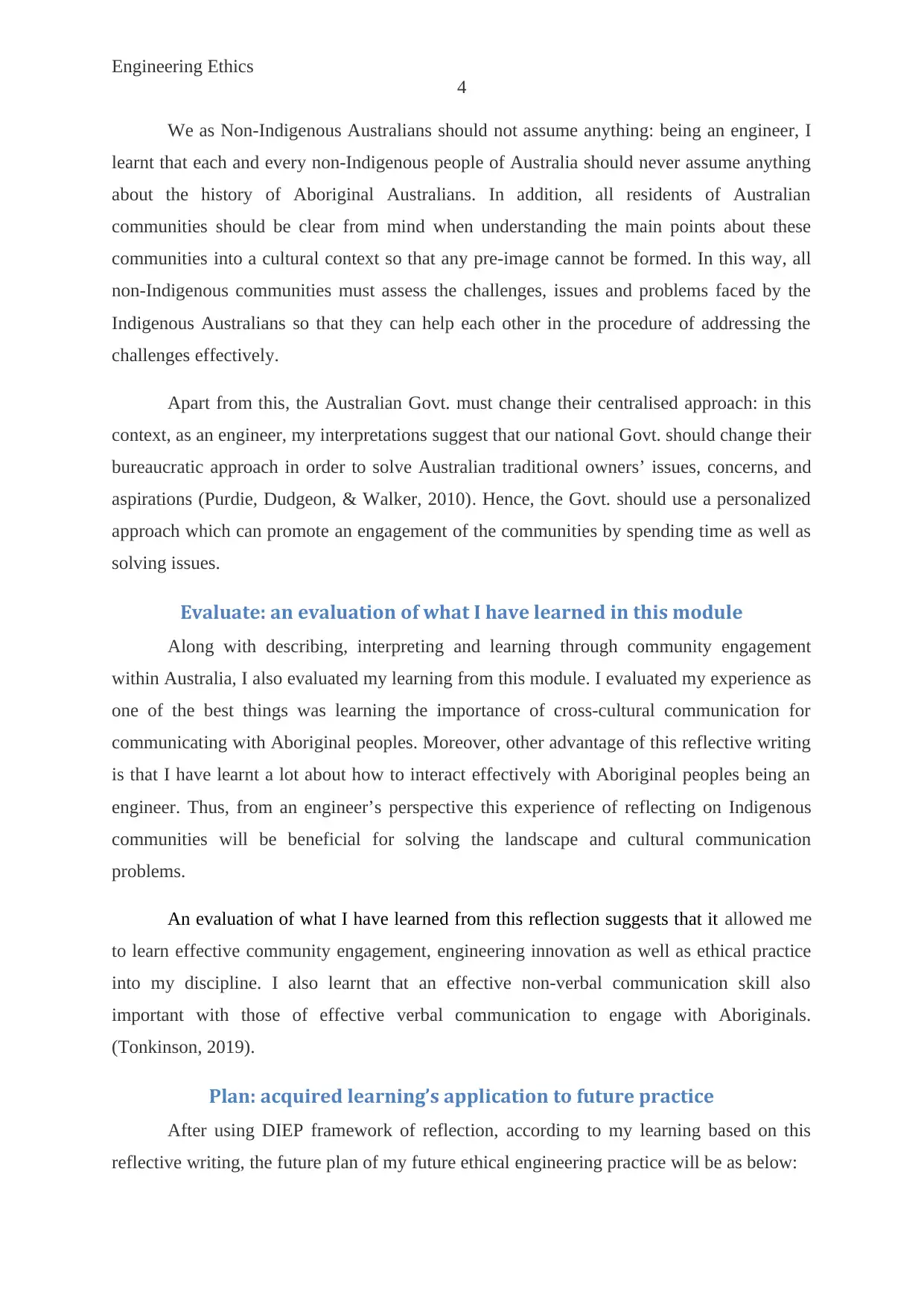
Engineering Ethics
4
We as Non-Indigenous Australians should not assume anything: being an engineer, I
learnt that each and every non-Indigenous people of Australia should never assume anything
about the history of Aboriginal Australians. In addition, all residents of Australian
communities should be clear from mind when understanding the main points about these
communities into a cultural context so that any pre-image cannot be formed. In this way, all
non-Indigenous communities must assess the challenges, issues and problems faced by the
Indigenous Australians so that they can help each other in the procedure of addressing the
challenges effectively.
Apart from this, the Australian Govt. must change their centralised approach: in this
context, as an engineer, my interpretations suggest that our national Govt. should change their
bureaucratic approach in order to solve Australian traditional owners’ issues, concerns, and
aspirations (Purdie, Dudgeon, & Walker, 2010). Hence, the Govt. should use a personalized
approach which can promote an engagement of the communities by spending time as well as
solving issues.
Evaluate: an evaluation of what I have learned in this module
Along with describing, interpreting and learning through community engagement
within Australia, I also evaluated my learning from this module. I evaluated my experience as
one of the best things was learning the importance of cross-cultural communication for
communicating with Aboriginal peoples. Moreover, other advantage of this reflective writing
is that I have learnt a lot about how to interact effectively with Aboriginal peoples being an
engineer. Thus, from an engineer’s perspective this experience of reflecting on Indigenous
communities will be beneficial for solving the landscape and cultural communication
problems.
An evaluation of what I have learned from this reflection suggests that it allowed me
to learn effective community engagement, engineering innovation as well as ethical practice
into my discipline. I also learnt that an effective non-verbal communication skill also
important with those of effective verbal communication to engage with Aboriginals.
(Tonkinson, 2019).
Plan: acquired learning’s application to future practice
After using DIEP framework of reflection, according to my learning based on this
reflective writing, the future plan of my future ethical engineering practice will be as below:
4
We as Non-Indigenous Australians should not assume anything: being an engineer, I
learnt that each and every non-Indigenous people of Australia should never assume anything
about the history of Aboriginal Australians. In addition, all residents of Australian
communities should be clear from mind when understanding the main points about these
communities into a cultural context so that any pre-image cannot be formed. In this way, all
non-Indigenous communities must assess the challenges, issues and problems faced by the
Indigenous Australians so that they can help each other in the procedure of addressing the
challenges effectively.
Apart from this, the Australian Govt. must change their centralised approach: in this
context, as an engineer, my interpretations suggest that our national Govt. should change their
bureaucratic approach in order to solve Australian traditional owners’ issues, concerns, and
aspirations (Purdie, Dudgeon, & Walker, 2010). Hence, the Govt. should use a personalized
approach which can promote an engagement of the communities by spending time as well as
solving issues.
Evaluate: an evaluation of what I have learned in this module
Along with describing, interpreting and learning through community engagement
within Australia, I also evaluated my learning from this module. I evaluated my experience as
one of the best things was learning the importance of cross-cultural communication for
communicating with Aboriginal peoples. Moreover, other advantage of this reflective writing
is that I have learnt a lot about how to interact effectively with Aboriginal peoples being an
engineer. Thus, from an engineer’s perspective this experience of reflecting on Indigenous
communities will be beneficial for solving the landscape and cultural communication
problems.
An evaluation of what I have learned from this reflection suggests that it allowed me
to learn effective community engagement, engineering innovation as well as ethical practice
into my discipline. I also learnt that an effective non-verbal communication skill also
important with those of effective verbal communication to engage with Aboriginals.
(Tonkinson, 2019).
Plan: acquired learning’s application to future practice
After using DIEP framework of reflection, according to my learning based on this
reflective writing, the future plan of my future ethical engineering practice will be as below:
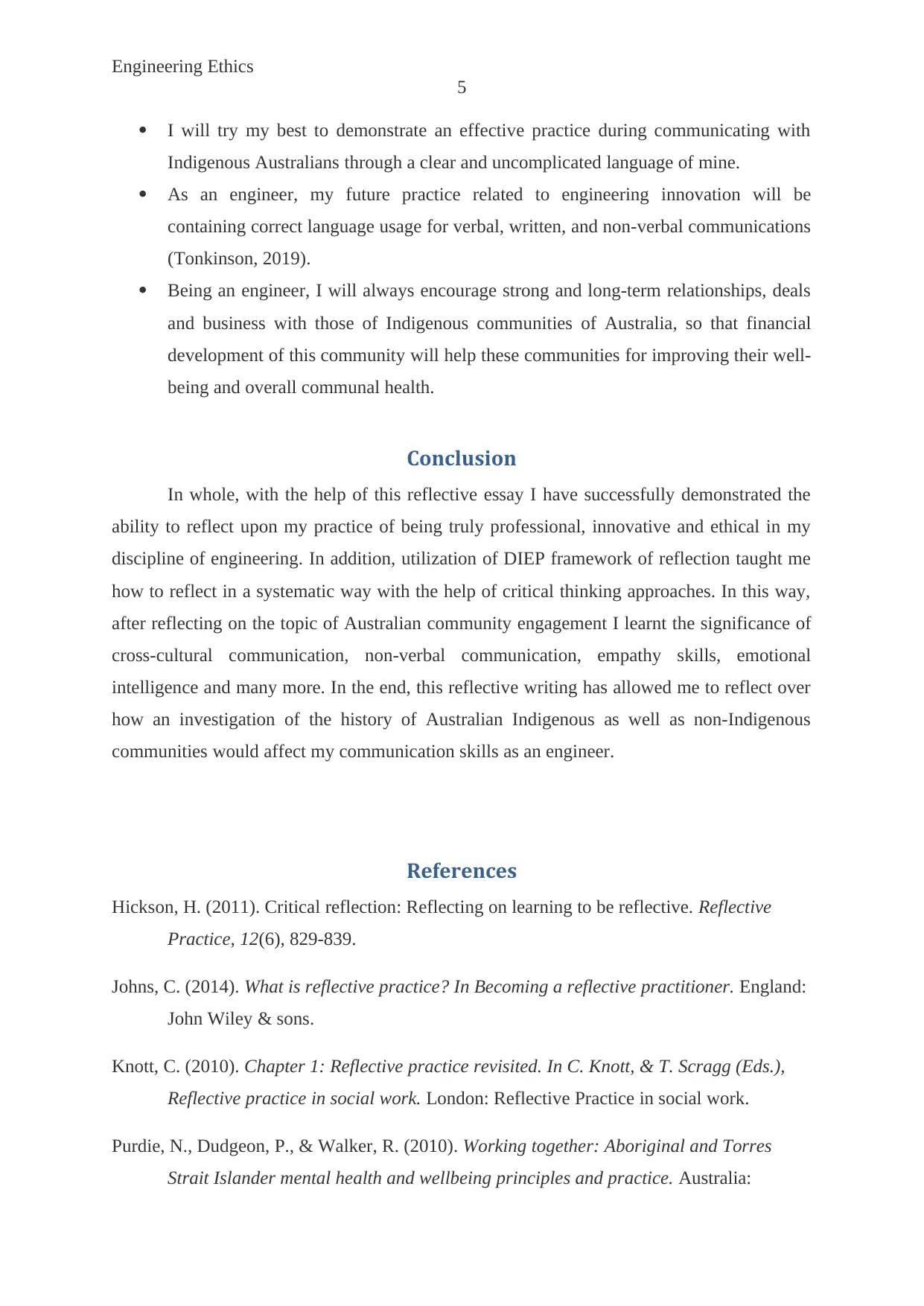
Engineering Ethics
5
I will try my best to demonstrate an effective practice during communicating with
Indigenous Australians through a clear and uncomplicated language of mine.
As an engineer, my future practice related to engineering innovation will be
containing correct language usage for verbal, written, and non-verbal communications
(Tonkinson, 2019).
Being an engineer, I will always encourage strong and long-term relationships, deals
and business with those of Indigenous communities of Australia, so that financial
development of this community will help these communities for improving their well-
being and overall communal health.
Conclusion
In whole, with the help of this reflective essay I have successfully demonstrated the
ability to reflect upon my practice of being truly professional, innovative and ethical in my
discipline of engineering. In addition, utilization of DIEP framework of reflection taught me
how to reflect in a systematic way with the help of critical thinking approaches. In this way,
after reflecting on the topic of Australian community engagement I learnt the significance of
cross-cultural communication, non-verbal communication, empathy skills, emotional
intelligence and many more. In the end, this reflective writing has allowed me to reflect over
how an investigation of the history of Australian Indigenous as well as non-Indigenous
communities would affect my communication skills as an engineer.
References
Hickson, H. (2011). Critical reflection: Reflecting on learning to be reflective. Reflective
Practice, 12(6), 829-839.
Johns, C. (2014). What is reflective practice? In Becoming a reflective practitioner. England:
John Wiley & sons.
Knott, C. (2010). Chapter 1: Reflective practice revisited. In C. Knott, & T. Scragg (Eds.),
Reflective practice in social work. London: Reflective Practice in social work.
Purdie, N., Dudgeon, P., & Walker, R. (2010). Working together: Aboriginal and Torres
Strait Islander mental health and wellbeing principles and practice. Australia:
5
I will try my best to demonstrate an effective practice during communicating with
Indigenous Australians through a clear and uncomplicated language of mine.
As an engineer, my future practice related to engineering innovation will be
containing correct language usage for verbal, written, and non-verbal communications
(Tonkinson, 2019).
Being an engineer, I will always encourage strong and long-term relationships, deals
and business with those of Indigenous communities of Australia, so that financial
development of this community will help these communities for improving their well-
being and overall communal health.
Conclusion
In whole, with the help of this reflective essay I have successfully demonstrated the
ability to reflect upon my practice of being truly professional, innovative and ethical in my
discipline of engineering. In addition, utilization of DIEP framework of reflection taught me
how to reflect in a systematic way with the help of critical thinking approaches. In this way,
after reflecting on the topic of Australian community engagement I learnt the significance of
cross-cultural communication, non-verbal communication, empathy skills, emotional
intelligence and many more. In the end, this reflective writing has allowed me to reflect over
how an investigation of the history of Australian Indigenous as well as non-Indigenous
communities would affect my communication skills as an engineer.
References
Hickson, H. (2011). Critical reflection: Reflecting on learning to be reflective. Reflective
Practice, 12(6), 829-839.
Johns, C. (2014). What is reflective practice? In Becoming a reflective practitioner. England:
John Wiley & sons.
Knott, C. (2010). Chapter 1: Reflective practice revisited. In C. Knott, & T. Scragg (Eds.),
Reflective practice in social work. London: Reflective Practice in social work.
Purdie, N., Dudgeon, P., & Walker, R. (2010). Working together: Aboriginal and Torres
Strait Islander mental health and wellbeing principles and practice. Australia:
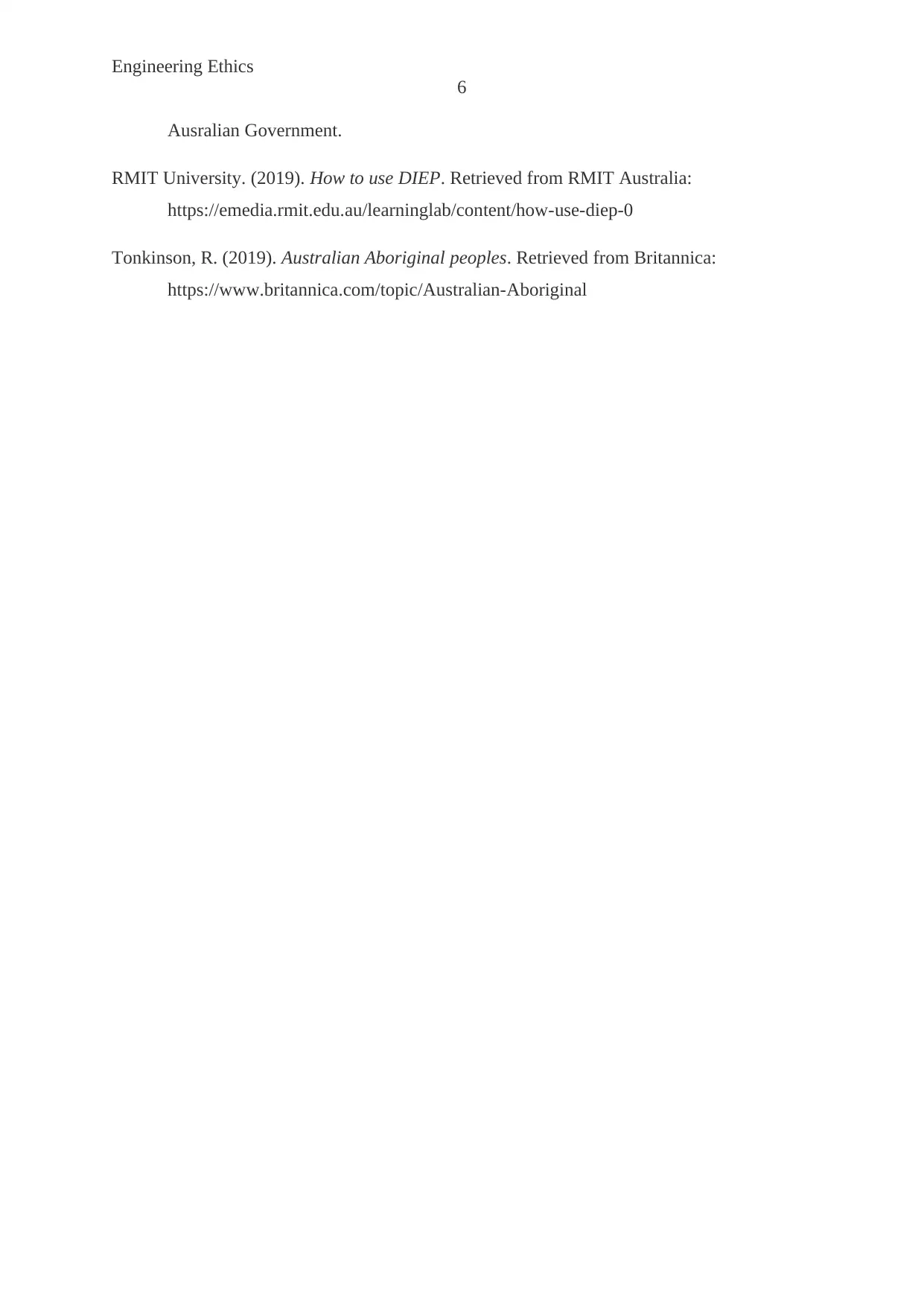
Engineering Ethics
6
Ausralian Government.
RMIT University. (2019). How to use DIEP. Retrieved from RMIT Australia:
https://emedia.rmit.edu.au/learninglab/content/how-use-diep-0
Tonkinson, R. (2019). Australian Aboriginal peoples. Retrieved from Britannica:
https://www.britannica.com/topic/Australian-Aboriginal
6
Ausralian Government.
RMIT University. (2019). How to use DIEP. Retrieved from RMIT Australia:
https://emedia.rmit.edu.au/learninglab/content/how-use-diep-0
Tonkinson, R. (2019). Australian Aboriginal peoples. Retrieved from Britannica:
https://www.britannica.com/topic/Australian-Aboriginal
1 out of 7
Related Documents
Your All-in-One AI-Powered Toolkit for Academic Success.
+13062052269
info@desklib.com
Available 24*7 on WhatsApp / Email
![[object Object]](/_next/static/media/star-bottom.7253800d.svg)
Unlock your academic potential
© 2024 | Zucol Services PVT LTD | All rights reserved.





